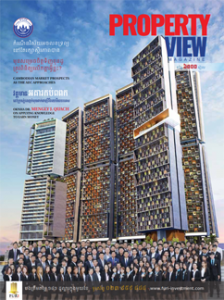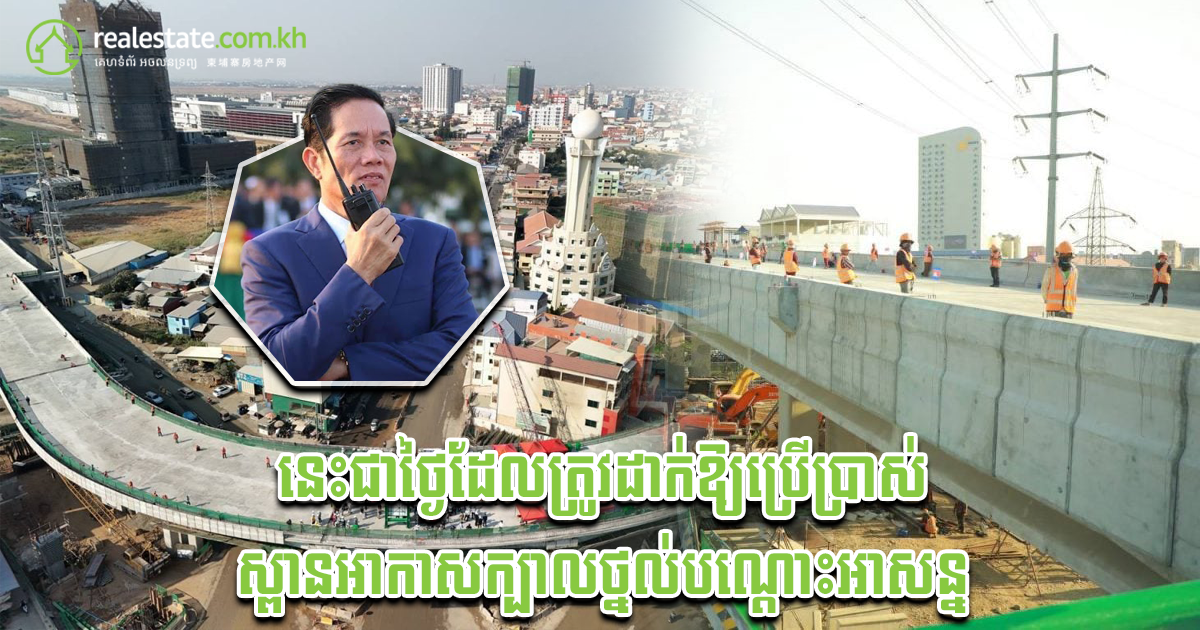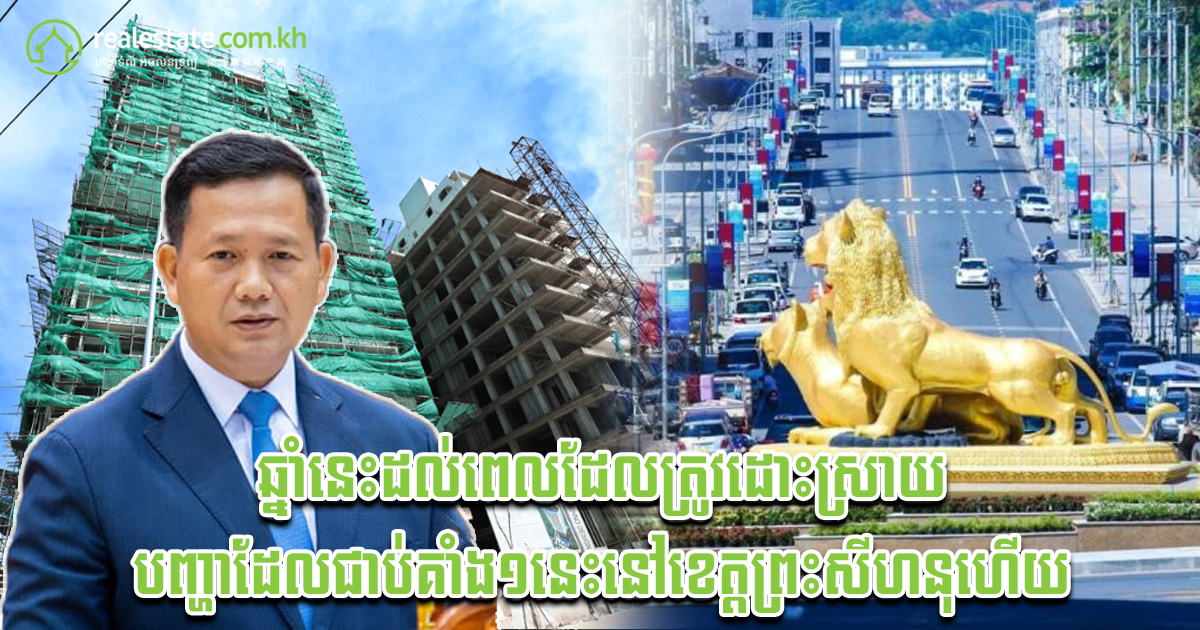Cambodian real estate has seen increases in land prices and investment that has quickly changed the face of the country, and its profile within the region. Yet, the question is whether the sector will continue to grow in the long-term. There are optimistic responses – but also some warnings from economists and real estate industry commentators.
 Po Eav Kong, General Manager of Asia Real Estate, said that there are two driving forces behind the progress in this sector.
The first force is ongoing political stability. This has equaled economic growth for Cambodia, a stable macro-economy and support for other sectors that contribute to overall economic growth. The construction sector investment, for example, increased from $900 million in 2010 to about $2 billion last year. The second force to look at is capital inflow, the economic and financial flows that have occurred, and regional changes in these flows.
An example is the new Vietnamese real estate law that took effect a few months ago. It allows foreigners to own land and residential property. This means competition for foreign investment between Vietnam and Cambodia will increase. Yet, despite these changes, legal systems and practice, and demographics, all factor into foreign investment decisions.
“I think overall the countries’ investment potential in real estate is still prominent because of our continued economic growth and stability,” said Po, “the sector will continue to grow for the next few years, but in the long-term I cannot predict because politics and the economy are not yet independent from one another.”
Po said the flow of new investors from Japan, Korea, Malaysia, Singapore and China, and the increased size of the countries’ middle-class, as well as a continuing supply of cheap labor, are all parts of the attraction for foreign investors coming into Cambodia.
Vorn Chanthorn, CEO of Town City Real Estate, seems positive about the growth in real estate.
Chanthorn believes the sector will continue to expand thanks to the stable environment and continued economic growth. He also suggests that average people and the Government are more aware of the importance of supporting the sector.
“The government has a good policy to attract foreign investors - they are allowed to buy houses in Cambodia from the first floor up regardless of their nationality.” He added, “I think there will be new policy in the future to encourage more investment.”
Chanthorn’s forecast is seemingly sound, since recently the government has adopted policies to boost the economy through promotion of the industrial sector. Its new economic development policy aims to draw in investors by replacing the primarily labor-driven economy with a technology-driven one.
However, Soeng Bonna, CEO of Bonna Realty Group, is cautious when it comes to risks and growth of this sector. He said it is difficult at this stage to conclude if growth still exists in the long run for these sectors - especially after the ASEAN Economic integration. If things remain as the status quo, the property sector will move forward, but we do not know how attractive big development projects will be to investors or how well they will do.
'So far, I have no knowledge if those already proposed major projects will continue, but smaller domestic projects will go forward.” He added, “It will be less profitable for bigger projects if there are many smaller ones priced from $2,500 to $3,000 per square meter. Those big projects will fall flat if foreigners’ demand for condos does not exist. Domestic demand will, however, continue.”
For Bonna, economic growth and political stability in Cambodia have yet to show signs of discouragement.
Yet, the government reforms do not look particularly attractive to investors either. So, it is clear that today’s condo demand (before ASEAN integration) is lower than the supply.
Mey Kalyan, economist and senior adviser of the Supreme Economic Council, has warned that people should be very careful saying, ‘houses are like body fat.’ Rather, consuming too much fat at once is not advisable; building too many houses while the demand for them remains low will not do the economy any good. Modern condos are not very productive; it is similar to when someone buys a luxurious car for themselves, as opposed to a bus which he or she could easily rent for profit.
He added, “We can hustle the market, but when it comes to real estate it is always a two-edge sword. If you buy as an investment or as a speculator, problems will arise. If you are buying with the expectation to keep the property and sell it for profit, foreigners can do so now as the price is reasonable for them for this dual-benefit purpose.”
The Ministry of Finance predicted in early July that Cambodia's economy will continue to maintain a growth rate of seven percent for the rest of the year, as it did last year, and the main sectors contributing to this growth are those of textile, construction and real estate.
Mr. Faisal Ahmed, IMF Resident Representative to Cambodia, said the real estate and construction sectors in Cambodia have helped spur economic growth and political stability because the sectors have provided lots of jobs to people and have significantly boosted income into the financial sector. However, the growth of supply that exceeds demand should remain under precise scrutiny.
However, Arn Channy, Sales and Marketing Executive of World City, which has been developing the satellite city CAMKO CITY, said from now into the next five years real estate in Cambodia will still be growing due to the increased demand and high number of investors.
When the full ASEAN integration is realized at the end of the year, Cambodia will benefit a lot because the inflow of people to find work and investment will consequently raise the demand for housing. He said, “Cambodia has huge potential for the future to come.”
Realestate.com.kh is proud to support the CVEA's Property View publication. Click here to get your copy, or if you are interested to join the CVEA today.
Po Eav Kong, General Manager of Asia Real Estate, said that there are two driving forces behind the progress in this sector.
The first force is ongoing political stability. This has equaled economic growth for Cambodia, a stable macro-economy and support for other sectors that contribute to overall economic growth. The construction sector investment, for example, increased from $900 million in 2010 to about $2 billion last year. The second force to look at is capital inflow, the economic and financial flows that have occurred, and regional changes in these flows.
An example is the new Vietnamese real estate law that took effect a few months ago. It allows foreigners to own land and residential property. This means competition for foreign investment between Vietnam and Cambodia will increase. Yet, despite these changes, legal systems and practice, and demographics, all factor into foreign investment decisions.
“I think overall the countries’ investment potential in real estate is still prominent because of our continued economic growth and stability,” said Po, “the sector will continue to grow for the next few years, but in the long-term I cannot predict because politics and the economy are not yet independent from one another.”
Po said the flow of new investors from Japan, Korea, Malaysia, Singapore and China, and the increased size of the countries’ middle-class, as well as a continuing supply of cheap labor, are all parts of the attraction for foreign investors coming into Cambodia.
Vorn Chanthorn, CEO of Town City Real Estate, seems positive about the growth in real estate.
Chanthorn believes the sector will continue to expand thanks to the stable environment and continued economic growth. He also suggests that average people and the Government are more aware of the importance of supporting the sector.
“The government has a good policy to attract foreign investors - they are allowed to buy houses in Cambodia from the first floor up regardless of their nationality.” He added, “I think there will be new policy in the future to encourage more investment.”
Chanthorn’s forecast is seemingly sound, since recently the government has adopted policies to boost the economy through promotion of the industrial sector. Its new economic development policy aims to draw in investors by replacing the primarily labor-driven economy with a technology-driven one.
However, Soeng Bonna, CEO of Bonna Realty Group, is cautious when it comes to risks and growth of this sector. He said it is difficult at this stage to conclude if growth still exists in the long run for these sectors - especially after the ASEAN Economic integration. If things remain as the status quo, the property sector will move forward, but we do not know how attractive big development projects will be to investors or how well they will do.
'So far, I have no knowledge if those already proposed major projects will continue, but smaller domestic projects will go forward.” He added, “It will be less profitable for bigger projects if there are many smaller ones priced from $2,500 to $3,000 per square meter. Those big projects will fall flat if foreigners’ demand for condos does not exist. Domestic demand will, however, continue.”
For Bonna, economic growth and political stability in Cambodia have yet to show signs of discouragement.
Yet, the government reforms do not look particularly attractive to investors either. So, it is clear that today’s condo demand (before ASEAN integration) is lower than the supply.
Mey Kalyan, economist and senior adviser of the Supreme Economic Council, has warned that people should be very careful saying, ‘houses are like body fat.’ Rather, consuming too much fat at once is not advisable; building too many houses while the demand for them remains low will not do the economy any good. Modern condos are not very productive; it is similar to when someone buys a luxurious car for themselves, as opposed to a bus which he or she could easily rent for profit.
He added, “We can hustle the market, but when it comes to real estate it is always a two-edge sword. If you buy as an investment or as a speculator, problems will arise. If you are buying with the expectation to keep the property and sell it for profit, foreigners can do so now as the price is reasonable for them for this dual-benefit purpose.”
The Ministry of Finance predicted in early July that Cambodia's economy will continue to maintain a growth rate of seven percent for the rest of the year, as it did last year, and the main sectors contributing to this growth are those of textile, construction and real estate.
Mr. Faisal Ahmed, IMF Resident Representative to Cambodia, said the real estate and construction sectors in Cambodia have helped spur economic growth and political stability because the sectors have provided lots of jobs to people and have significantly boosted income into the financial sector. However, the growth of supply that exceeds demand should remain under precise scrutiny.
However, Arn Channy, Sales and Marketing Executive of World City, which has been developing the satellite city CAMKO CITY, said from now into the next five years real estate in Cambodia will still be growing due to the increased demand and high number of investors.
When the full ASEAN integration is realized at the end of the year, Cambodia will benefit a lot because the inflow of people to find work and investment will consequently raise the demand for housing. He said, “Cambodia has huge potential for the future to come.”
Realestate.com.kh is proud to support the CVEA's Property View publication. Click here to get your copy, or if you are interested to join the CVEA today.






Comments